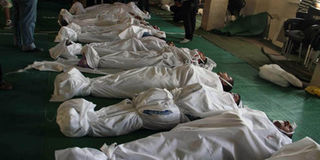Clashes kill 70 as Egypt Islamists protest

Bodies are seen laid out at a mosque in Cairo on August 16, 2013 as clashes broke out during a demonstration in support of Egypt's ousted president Mohamed Morsi. Dozens of people were killed across Egypt in clashes after Friday prayers between Islamist protesters and security forces, according to tolls from witnesses, security sources and the health ministry. PHOTO / KHALED KAMEL
What you need to know:
- Violence erupted soon after protesters emerged from mosques following Friday prayers, with gunshots ringing out in Cairo and security forces firing tear gas.
- In the capital, a man leapt off a bridge near a police station to escape shooting as police armoured vehicles advanced on protesters, witnesses said.
- Egypt defended the crackdown and announced it was cancelling naval exercises with Turkey to protest Ankara's condemnation.
CAIRO
Thousands of Islamists protested Friday across Egypt, sparking violence that killed at least 70 people and turned parts of Cairo into battlefields after police authorised the use of live ammunition.
The clashes came two days after 578 people were killed in Egypt as police cleared two Cairo protest camps set up by loyalists of ousted Islamist president Mohamed Morsi, in the country's bloodiest day in decades.
That crackdown drew strong condemnation from the international community, and EU foreign affairs chief Catherine Ashton called Friday for the bloc to adopt "appropriate measures" in response.
But Egypt's cabinet issued a defiant statement, even as clashes continued in the hour before a night-time curfew began, saying it was confronting a "terrorist plot".
In Jordan, Morocco and the Palestinian territories, meanwhile, hundreds joined demonstrations in support of Morsi's Muslim Brotherhood movement.
The Islamist coalition led the Brotherhood had called for "Friday of anger" rallies across Egypt in response to the crackdown on their protest camps.
And violence erupted soon after protesters emerged from mosques following Friday prayers, with gunshots ringing out in Cairo and security forces firing tear gas.
In the capital, a man leapt off a bridge near a police station to escape shooting as police armoured vehicles advanced on protesters, witnesses said.
An AFP correspondent counted at least 19 bodies in one Cairo mosque, while eyewitnesses said more than 20 corpses had been laid out in a second mosque.
Security sources and the health ministry reported at least 31 dead, including four in the Suez Canal city of Ismailiya and another eight in northern Damietta.
In Cairo, streets were virtually deserted except for demonstrators and security forces, with the army deploying at key points in the city.
But some residents formed their own roadblocks, checking identity papers and searching cars.
The interior ministry, which on Thursday authorised police to use live fire if government buildings came under attack, accused the Brotherhood of attacking police stations, saying it foiled several attempts to storm buildings.
And the cabinet issued a defiant statement accusing the Brotherhood of a "terrorist plot".
"The cabinet affirms that the government, the armed forces, the police and the great people of Egypt are united in confronting the malicious terrorist plot by the Muslim Brotherhood," it said.
Marches were also reported in the Mediterranean city of Alexandria, in Beni Sueif and Fayyum, south of Cairo, and in the Red Sea resort town of Hurghada.
Wednesday's bloody crackdown on the pro-Morsi protest camps has polarised Egypt, splintering the army-installed government and drawing forceful international condemnations.
The president of the UN Security Council pleaded for "maximum restraint" after an emergency meeting on Wednesday's violence.
But Egypt defended the crackdown and announced it was cancelling naval exercises with Turkey to protest Ankara's condemnation.
Turkey, which backs Morsi, has recalled its ambassador to Cairo over the violence, prompting a tit-for-tat move by Egypt.
The EU's foreign policy chief described the violence in Egypt as "shocking."
"I have asked member state representatives to debate and coordinate appropriate measures to be taken by the European Union in response to the situation in Egypt," said Ashton.
Germany said it would review ties with Cairo, and joined France in calling for EU talks on the situation, which are expected to take place on Monday.
French President Francois Hollande was discussing the crisis with counterparts in London, Berlin and Rome.
On Thursday, the UN Security Council held an emergency meeting on Egypt, calling for an end to the violence and "national reconciliation".
US President Barack Obama said Washington was cancelling a joint US-Egyptian military exercise.
"While we want to sustain our relationship with Egypt, our traditional cooperation cannot continue as usual when civilians are being killed in the streets and rights are being rolled back," he said.
But despite scrapping the exercise, he stopped short of suspending Washington's annual $1.3 billion in aid.
The international response was not uniformly critical, however, with Saudi King Abdullah saying he backed Egypt's fight against "terrorism".
Saudi Arabia "stands with its Egyptian brothers against terrorism, deviance and sedition, and against those who try to interfere in Egypt's internal affairs," he said.
The unrest troubled markets, with oil prices up on fears that the violence could impact shipments through the Suez Canal or spark further Middle East unrest, analysts said.




